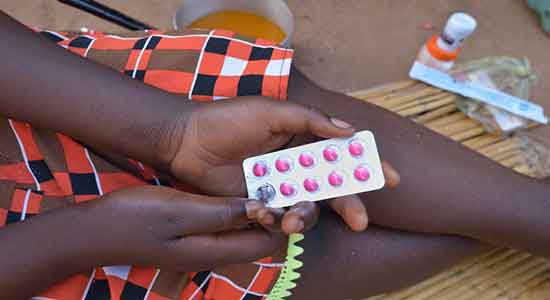 Health
Health
Health is one of University of Copenhagen's core research areas in relation to developing countries.
The research area covers
- Prevention, treatment and monitoring of serious and widespread health concerns, incl. undernourishment, malaria, HIV, TB, neglected poverty-related infection diseases, sanitation and hygiene, diabetes and other chronic diseases, reproductive health
- The potential and safety of traditional medication
- Public health implications of the double burden of disease
Relevant centres and departments
Copenhagen School of Global Health
Copenhagen School of Global Health is an inter-faculty school hosted at the Faculty of Health and Medical Sciences. Research focuses on the double burden of disease and social inequalities in health. These include the chronic and non-communicable diseases that increasingly affect underprivileged societies, the infectious diseases that disproportionately affect them, detrimental disease interactions, problems such as weak health systems, inadequate food safety and nutritional deficiencies, as well as irrational drug use and cultural, societal, gender-based and environmental barriers to health.
Global Health Section
The research at the Department of Public Health's Global Health Section takes an interdisciplinary approach to global health, and covers a wide range of topics such as diabetes and double burden of disease, environmental health, disaster and emergency health, infectious and neglected tropical diseases, sexual and reproductive health, and health care delivery in low-income societies. The Global Health Section has a strong focus on education and outreach, and is active in many capacity building projects with partners in low-income countries. The Section hosts the secretariates of both the School of Global Health, University of Copenhagen and the Copenhagen Center for Disaster Research (COPE).
Centre for Medical Parasitology
Research at the centre is concentrated on malaria, and covers a wide range of disciplines from applied field studies in Africa to basic laboratory research in Copenhagen. Major current research topics include drug resistance, experimental parasitology, field studies, immunology, parasite biology, pathogenesis, and vaccine development. CMP is part of a well-established international scientific network, composed of scientists in Europe, Africa, America and Australia. The research is organised in a number of research teams. The Centre for Medical Parasitology is formalizing the close collaboration between research groups at the Institute for Medical Microbiology and Immunology (IMMI) and the Institute of Public Health, University of Copenhagen, and the Departments of Infectious Diseases (DID), and Clinical Microbiology (DCM) at Copenhagen University Hospital (Rigshospitalet).
Copenhagen HIV Programme
Copenhagen HIV Programme (CHIP) work to improve the treatment of patients with HIV and other infectious diseases – for example by clarifying the advantages and disadvantages of various medical treatments. CHIP initiate and co-ordinate research projects carried out within an international network built up over the past 20 years. Today, this network is made up of more than 200 hospitals from around the world. CHIP is a separate research unit at the Faculty of Health Sciences at University of Copenhagen. CHIP has a strong collaboration with the Rigshospitalet's Centre for Viral Diseases at the Department of Infectious Diseases. In addition, CHIP hosts the Copenhagen Secretariat for the international organisation Health Systems Global.
Relevant research units
Section for Parasitology and Aquatic Pathobiology
Section for Parasitology and Aquatic diseases studies parasites and other infections in humans and animals including fish. The main focus is on population and infection biology, host immunity and parasite-induced immune-modulation, parasitic zoonoses and control. The section uses animal models and in vitro systems and develops diagnostics, vaccines and prevention and control programs. Traditionally the section has a strong focus on collaboration with third world countries. The former "Parasitology, Health and Development" is now part of Section for Parasitology and Aquatic Pathobiology.
Section for Community Dentistry
The overall aim of the section for Community Dentistry at the Department of Odontology is to provide undergraduate students with scientifically based knowledge, attitude and skills within Community Dentistry, hereunder sound knowledge of the oral health situation and the oral health care at international level, including health programmes of the World Health Organisation. Community Dentistry is a WHO Collaborating Centre for Community Oral Health Programs and Research. The section is involved in a number of ongoing research projects related to oral disease and oral health among children and adults, including in Madagascar, Comoros Islands, Tanzania and Burkina Faso.
Researcher group in Health and Life Conditions
The anthropology of health has been a priority area at the Department of Anthropology since the 1980s. Over the years, teaching, research and PhD training have developed and diversified this field. Starting with an interest in culturally specific perceptions of illness and therapeutic itineraries, the field has taken on a more global perspective, while maintaining commitment to in-depth ethnography.
An interest in changing patterns of power, sociality, health consciousness and institutional practices permeates a varied spectrum of research projects. The classic comparative method embraces a focus on social differences and inequities within, as well as between, societies.
Research Group on Paediatric and International Nutrition
In the field of international nutrition the research group at the Department of Nutrition, Exercise and Sports (formerly the Department of Human Nutrition) has special expertise in performing studies in developing countries for the purpose of establishing a scientific basis for development programmes that may contribute to alleviating malnutrition. Internationally, we collaborate with research institutions in both western countries and developing countries, e.g. Ethiopia, Kenya and Cambodia. Other partners include international organizations such as the World Health Organzation (WHO), UNICEF, World Food Programme (WFP) and Médecins sans Frontières.
Profile magasine
Read the University of Copenhagen's profile magasines on global health as e-pages:
Project examples
Health Systems Global
 Health Systems Global is the first international membership organization fully dedicated to promoting health systems research and knowledge translation. The Copenhagen Secretariat is hosted by Copenhagen HIV Programme (CHIP) at University of Copenhagen.
Health Systems Global is the first international membership organization fully dedicated to promoting health systems research and knowledge translation. The Copenhagen Secretariat is hosted by Copenhagen HIV Programme (CHIP) at University of Copenhagen.

